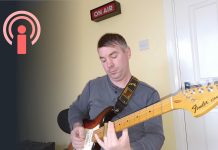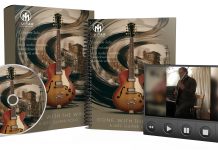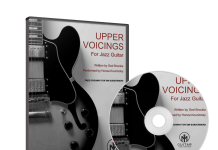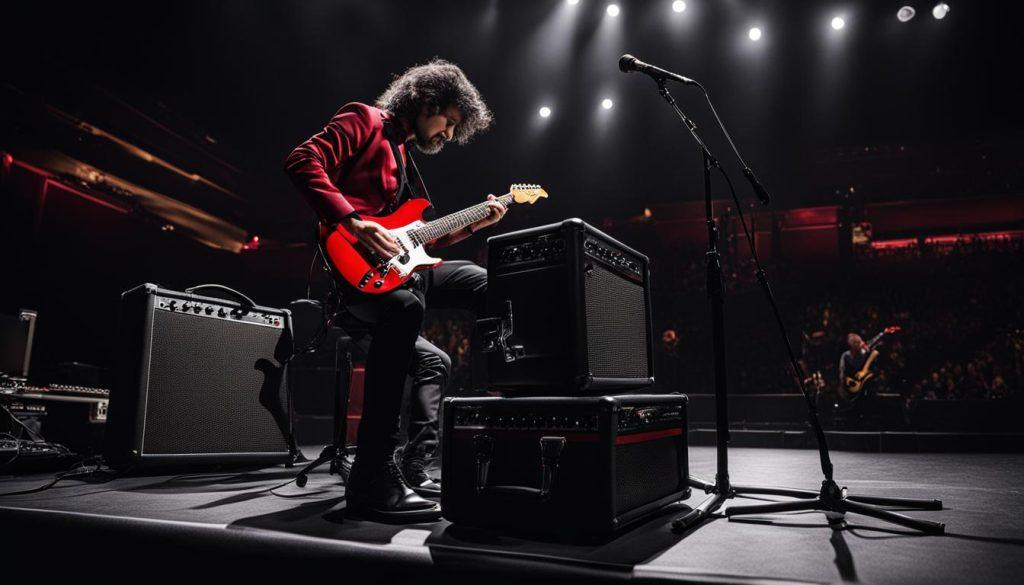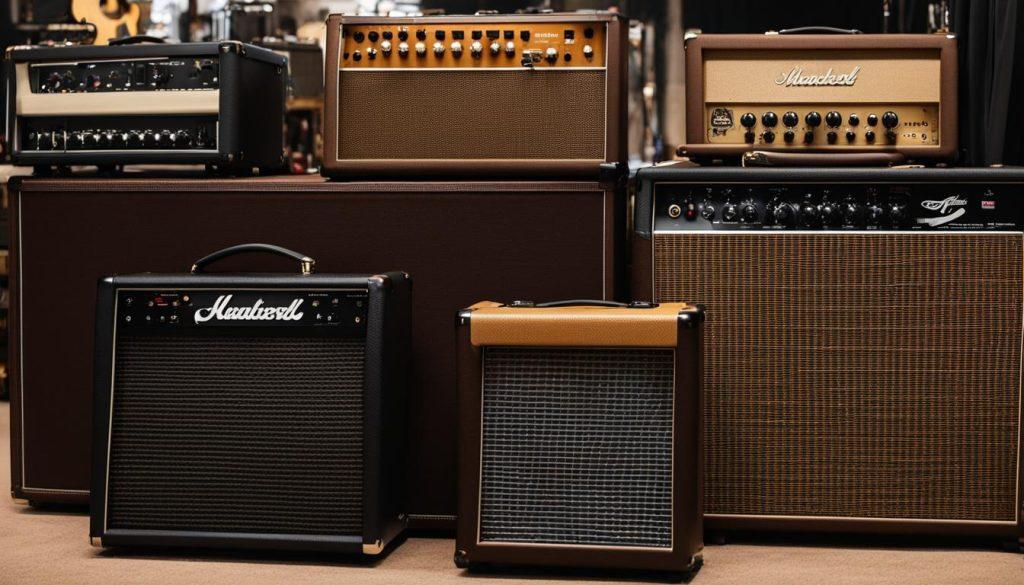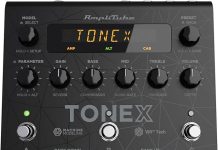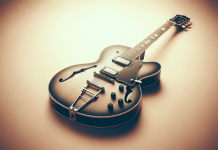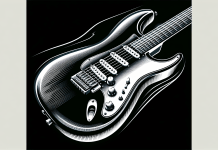This post may contain affiliate links. As an Amazon Associate, Guitar & Music Institute may earn commissions from qualifying purchases.
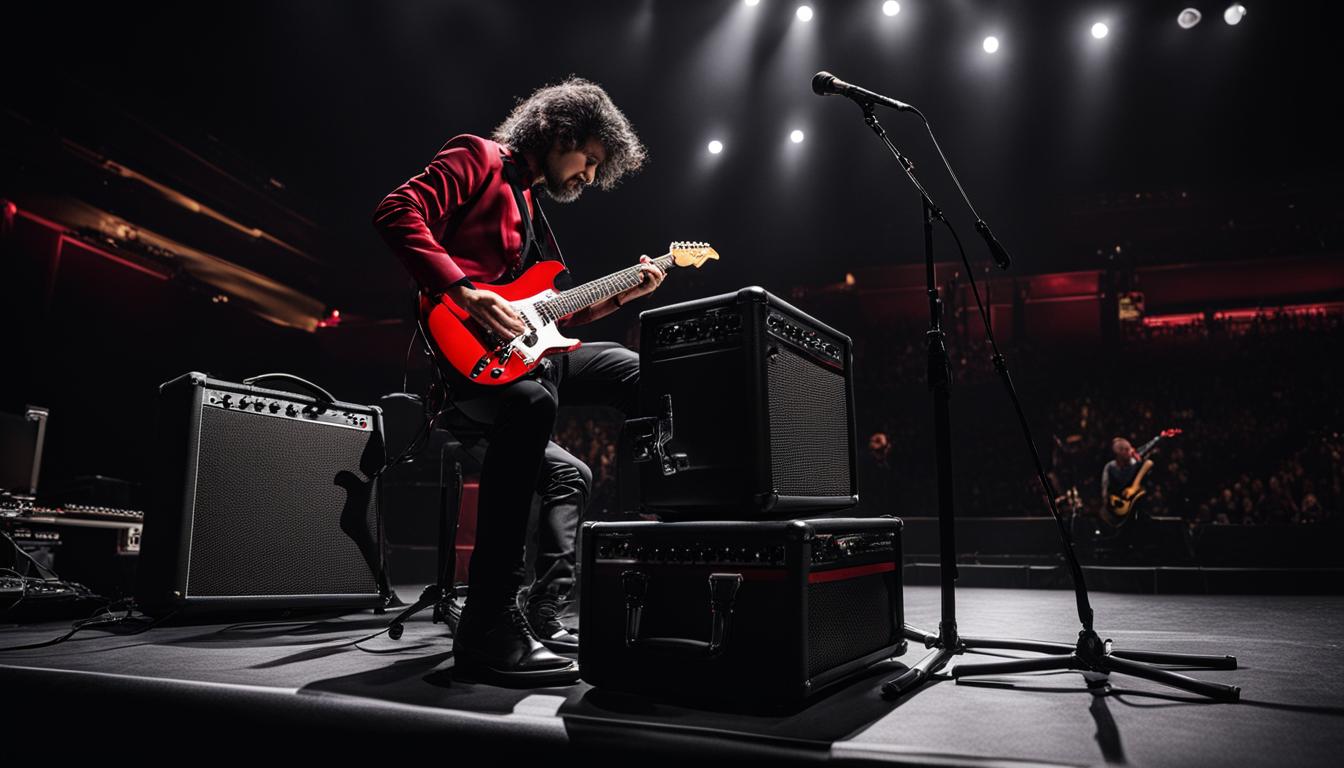
Unlock the fullest potential of your electric guitar by choosing the right amplifier for your guitar playing style. The perfect match between guitar and amp can elevate your sound, allowing you to fully express yourself through music. Whether you’re practicing in the comfort of your home or commanding the stage in a live performance, a careful selection from the wide array of guitar amp options can lead to unparalleled satisfaction.
There’s nothing quite like finding the perfect guitar amp that resonates not just with your guitar, but with your soul like the Fender Tone Master https://amzn.to/3Tpm6fW. The art of matching your amp to your playing style is one that can take your musical expression to new heights. From crystalline cleans that sparkle to growling distortion that commands attention, the right amp is your gateway to auditory bliss.
Key Takeaways
- Defining your playing style helps to narrow down amplifier choices.
- Identify amps best suited for your musical genre – from jazz to heavy metal.
- Consider the size and power of the amp for practice versus performance needs.
- Look for amps that offer tonal variety and a range of effects to enhance creativity.
- Factor in portability if you’re a gigging musician who travels frequently.
- Remember, the perfect guitar amp should complement your personal sound and style.
Choosing The Right Amplifier For Your Guitar Playing Style
Embarking on the quest for the perfect guitar amplifier involves a symphony of considerations that cater to your unique sound and playing style. Diving into the world of amplifiers can sometimes feel like navigating an endless sea of options. But don’t fret—by honing in on your genre, understanding amp types, and considering practicalities such as size and portability, you can match an amp to your playing style like a chord progression to a melody.
Understanding Your Musical Genre Needs
Every genre paints its own acoustic canvas and your amplifier choice should provide the right palette of tones. If you’re shredding metal riffs, an amp with robust gain and the capacity for a darker, overdriven sound might be your ally. Contrastingly, if you strum to the rhythms of country or pluck the mellow sounds of jazz, you’ll want an amp that delivers clear, articulate tones, and perhaps, a touch of built-in reverb for that smooth ambiance.
Assessing the Impact of Amp Types on Your Sound
The type of amplifier you choose has a substantial effect on your tonal quality and performance experience. Let’s look at a comparison:
| Amp Type | Characteristic Sound | Typical Genres | Notable Brands |
|---|---|---|---|
| Tube Amps | Warm, rich, dynamic | Blues, Rock, Jazz | Fender, Marshall, Vox |
| Solid State Amps | Clean, reliable, maintenance-free | Pop, Country, R&B | Roland, Orange, Peavey |
| Modeling Amps | Versatile, programmable, emulating | All genres | Line 6, Boss, Yamaha |
| Hybrid Amps | Blend of warm tube and solid state efficiency | Varied, versatile players | Blackstar, Vox, Hughes & Kettner |
Knowing these distinctions helps in aligning your equipment with your creative aspirations.
Considering Amp Size and Portability for Gigging Musicians
Are you a musician on the go, or do you command the stage from a single venue? The portability of your amplifier can be as crucial as its sound. Small, portable amps are ideal for those frequently moving from gig to gig, making setup swift and transportation manageable. Conversely, if your performances are stationary, larger amps afford the luxury of more power and possibly greater built-in effects and connectivity options.
When choosing the right amplifier for your guitar playing style, it’s essential to balance sound quality with practical needs, ensuring that your music never misses a beat—no matter where you’re playing.
The Significance of Amp Wattage and Volume Controls
When you’re on the pursuit finding the perfect guitar amp, understanding the significance of amp wattage and volume controls is essential. This is often a cornerstone principle in any solid amplifier buying guide. A guitar amp’s wattage can greatly influence your sound’s reach and clarity, especially in live settings, while volume controls provide the finesse needed to balance loudness with tonal purity.
For most beginners and home enthusiasts, amp selection tips often highlight that smaller practice amps, which often range from 10 to 40 watts, are more than adequate. They typically suffice for solo practice sessions in your personal space or jam sessions in intimate venues without overwhelming the room.
| Environment | Recommended Wattage | Volume Control Importance |
|---|---|---|
| Home Practice | 10-30 Watts | Essential for managing sound levels in shared spaces |
| Small Venues | 30-50 Watts | Allows for versatility in various room sizes |
| Medium Venues | 50-100 Watts | Crucial for sound projection while maintaining tone quality |
| Outdoor/ Large Venues | 100+ Watts | Required to cut through noise and reach wider audiences |
If you’re looking to perform in larger venues or outdoors, you’d typically look at medium-sized amps in the 50 to 100 watt range. These amplifiers are capable of pushing your sound further, so you’re heard loud and clear even in the back rows. Remember, having an amp that goes above and beyond your typical setting provides flexibility, but always consider weight and portability, which can become an issue with higher wattage units.
Knowing how to manipulate your guitar amp’s volume controls is just as important as the wattage, often allowing guitarists to achieve a sweet spot where tone and volume coexist harmoniously — this separates the seasoned players from the novices.
- Gain Control: Adjusts the amount of distortion in your sound, from clean to heavy.
- Master Volume: Manages the overall output without altering the gain levels.
- Equalization: Fine-tunes the bass, mid, and treble frequencies to shape your tone.
- Additional Volume Options: Reverb and effects level controls can also impact perceived loudness.
As part of amp selection tips, you’re encouraged to experiment with settings on different amplifiers to comprehend how wattage and volume affect performance. There’s no one-size-fits-all approach — the quest is to discover an amplifier that complements your specific needs, whether that’s bedroom strumming or rocking out on stage.
Key Features to Look for in a Beginner’s Guitar Amp
Starting your journey into the world of guitar playing is an exciting venture, and finding the right amp can make all the difference. As you venture into the process of selecting your first amplifier, consider this amplifier buying guide crafted to help you identify the best amplifier for guitar novices. Focus on guitar amplifier selection that offers ease of use and room for growth as you refine your skills.
Essential Controls and Inputs for Beginners
While high-end equipment might be tempting, the essentials are what you should prioritize. Look for amps that provide fundamental sound control to shape your music. A good beginner’s amp comes with:
- Gain: To adjust the amount of distortion
- Volume: To set your overall output level
- Treble: To manage the high-end frequencies
- Bass: To control the low-end punch
Additionally, inputs are just as crucial for practice. An amp that includes a headphone jack ensures you can practice without disturbing others, while an auxiliary input allows for playing along with your favorite tracks.
The Role of Built-In Effects for Creative Experimentation
As a new guitarist, experimenting with sound is vital for your creative growth. Amps with built-in effects can expand your musical landscape and encourage exploration:
- Reverb: Adds depth to your tone
- Chorus: Creates a richer, more layered sound
- Delay: Echo effects for expanding sound texture
These effects can inspire your playing and help you grasp the dynamics of sound shaping without requiring additional gear. Embrace the possibilities these features unlock, bringing your practice sessions to new heights of creativity, enabling you to become well-versed in the audible art as you stride forward in your musical journey.
Top Picks for Ultra-Portable Guitar Amps
For guitarists who are always on the move, finding the perfect guitar amp that doesn’t sacrifice sound for portability is a must. Whether you’re practicing in your room, recording on-the-go, or jamming with friends outdoors, a great ultra-portable amp is your best companion. Let’s look at why the Mustang Micro is heralded as the best amplifier for guitar enthusiasts seeking compactness without compromise.
The Mustang Micro, a standout in guitar amplifier selection, offers a direct plug-and-play interface with your guitar. This eliminates the tangle of cables and simplifies the setup, letting you focus solely on making music. Moreover, it boasts a variety of amp models and effects combinations allowing you to experiment and discover your unique sound effortlessly. Here are some features that make the Mustang Micro a prime example of streamlined portable design:
- Bluetooth compatibility – easily play music or backing tracks from your device.
- Headphone jack – for private practice sessions or silent rehearsals.
- USB-C input – offers versatile connectivity for charging and data transmission.
These features assure that your quest in guitar amplifier selection ends with a balance of mobility and feature-rich performance. The Mustang Micro’s design satisfies modern demands for a guitar amp that can keep up with a bustling lifestyle while providing diverse tonal options.
Whether you’re a seasoned musician searching for a travel-friendly practice option or a beginner eager to explore various sonic landscapes without the bulk, the Mustang Micro makes finding the perfect guitar amp an attainable reality. This mighty mini amp is proof that great things often come in small packages, especially for those who prioritize portability without losing the essence of a good guitar tone.
Best Practice Amps to Refine Your Technique
When you’re on the lookout for the best amplifier for guitar practice, your focus should be on finding a unit that allows you to master your skills with ease. Ideally, it should combine quality tone controls with features conducive to frequent, focused practice sessions. As you embark on the journey of refining your guitar prowess, the right practice amplifier can make all the difference in your technical progression and tone development. Let’s dive in and explore the elements that make for an exceptional practice amp.
Finding an Amp with Quality Tone Controls
An amp that is lauded as the best amplifier for guitar learners is one that provides superior control over your sound. A practice amp like the Frontman 10G is a fantastic choice for beginners eager to shape their tone. It’s straightforward to use with intuitive controls for gain, volume, and equalization which unquestionably lays down the foundation for effective tone shaping. Moreover, the inclusion of an overdrive switch opens doors for you to experiment and discover the diverse tonal variations your guitar can produce, all of which are essential amp selection tips for any burgeoning guitarist.
Compatibility with Headphones for Silent Practice
Moreover, the quest for guitar amplifier selection should also involve considering the practical aspects of practice. That’s where headphone compatibility comes into play. A practice amp fitted with a headphone jack allows you to practice silently, making it perfect for those times when you need to keep the noise down. Whether it’s late at night or you’re in a shared living space, practicing with headphones means you don’t have to sacrifice your practice time or disturb others. This reflects a thoughtful approach in amp selection tips, ensuring it meets your lifestyle.
In conclusion, embrace these guidelines to maximize your practice efficiency with a top-notch amplifier. Remember, the process of guitar amplifier selection is crucial to the growth of a musician and helps embed the subtleties of tonal quality and dynamics in your performance. Hence, choose wisely, work diligently, and watch as your technique improves leaps and bounds.
Amp Tone and Effects: Crafting Your Unique Sound
Stepping into the world of guitar amplifiers can be akin to discovering a new realm of musical expression. To authentically match your amp to your playing style, you’ll need to explore beyond basic functionalities and delve into the impact of tone and effects on your overall sound. A truly reflective choice of amp can amplify your musical voice and personal style.
As you navigate through this amplifier buying guide, consider how the various built-in presets and effects of contemporary amps can enhance your creative output. Fueled by technology, models such as the Mustang LT25 come equipped with a plethora of sound-modifying features that cater to any genre—from the twangy reverberation ideal for country, to lush chorus effects that define the dreaminess of shoegaze, as well as overdriven settings for the savage roar of metal.
| Effect | Description | Best Genres |
|---|---|---|
| Reverb | Adds echoes for the depth of tone, simulating different acoustic environments. | Jazz, Blues, Rockabilly |
| Delay | Repeats the played notes at set intervals, creating a layered sound. | Progressive Rock, Experimental, Ambient |
| Distortion | Modifies the sound wave to produce a gritty, aggressive tone. | Rock, Metal, Punk |
| Chorus | Creates a shimmering effect, duplicating the signal and shifting its pitch and timing. | Pop, Alternative, Shoegaze |
| Flanger | Produces a swirly effect reminiscent of a jet plane by mixing two identical signals with one slightly delayed. | Psychedelic Rock, Electronic, New Wave |
Your quest to find guitar amp options that align with your unique style doesn’t just rest on amplification alone—your playing style demands personalization. The right choice involves mixing and matching various presets and effects to discover settings that resonate with your musical identity. Understanding these sonic tools and their applications in your preferred genres will steer you closer to crafting a distinctive and fulfilling sound. In essence, the amp becomes an extension of your instrument—a partner in your musical journey.
Untangling the Different Types of Guitar Amps
As a guitarist, delving into the nuances of amp selection tips is crucial for enhancing your playing experience. Each guitar amp type offers a unique set of qualities that can elevate your music dramatically. Let’s explore the core types to find an option that resonates with your sound expectations and playing aspirations.
The Classic Warmth of Tube Amps
Tube amps, revered for their warm, dynamic tones, encapsulate the spirit of vintage sound. These amps use vacuum tubes to amplify the signal, resulting in a rich harmonic distortion that’s highly sought after by enthusiasts and professional musicians alike. The responsiveness of tube amps to your playing dynamics makes them a timeless choice for those pursuing a classic sound.
The Reliability of Solid State Amps
Solid state amps rely on semiconductor circuits to produce clean, crisp sounds and are appreciated for their reliability and maintenance ease. The consistency in tone at various volume levels makes them a go-to for guitarists who demand a straightforward, durable solution. These amps handle effects well, adding to their versatility in a multitude of playing contexts.
The Versatility of Modeling Amps
Embracing the digital age, modeling amps offer unprecedented versatility by emulating the sounds of numerous amplifiers. Equipped with modern technology, they allow you to experiment with a diverse array of presets and effects, making them an all-in-one powerhouse for creative exploration.
The Best of Both Worlds: Hybrid Amps
For guitarists torn between the classic and the contemporary, hybrid amps present the perfect compromise. Merging the tonal warmth of tubes in the preamp stage with the sturdiness of solid-state components in the power stage, hybrid amps deliver a blend of sound and reliability that caters to a broad spectrum of styles and preferences.
Understanding these guitar amp options lays the foundation for an informed decision-making process. Use this amplifier buying guide as your roadmap to navigate through the varied landscape of guitar amps, and pinpoint the one that will amplify not just your guitar’s sound, but also your musical journey.
The Guitar Amp Selection Tips for Seasoned Players
As you delve into refining your sound and equipment, the quest for the best amplifier for guitar becomes paramount. For the seasoned player, an amp isn’t just about amplification—it’s an extension of your instrument’s voice and your artistic identity. Your years of experience wielding the guitar translate into informed choices that bridge the gap between gear and genius.
Matching Amps to Vintage and Modern Guitars
The soul of your guitar, be it a storied vintage or a sleek modern axe, demands an amp that complements its characteristics. A classic strat might yearn for the warm embrace of a tube amp to revive those timeless vibes. Meanwhile, a contemporary multi-faceted model may find its best match in the versatility of a solid-state or modeling amplifier. When selecting an amp, think of it as finding a dance partner for your guitar—one that flows with its moves and enhances its strengths.
In-Store versus Online: The Best Way to Test an Amp
Wrestling with the decision to buy an amp online or in-store? If the tactile experience of tweaking knobs and gauging responses is vital to you, then visiting a brick-and-mortar shop might be the road to take. In-store shopping affords you the luxury of live sound testing and professional advice, ensuring your amp selection tips aren’t just theoretical. Conversely, the digital domain is a treasure trove of reviews and community wisdom, which can help guide your purchase-especially for those rare finds or niche amplifiers not readily available in local shops.
| Amp Feature | In-Store | Online |
|---|---|---|
| Sound Testing | Immediate feedback; authentic experience | Relies on reviews and samples |
| Expert Advice | Personal professional guidance | Forums and customer reviews |
| Selection | May be limited by inventory | Wider range, including rare finds |
| Convenience | Travel and in-person interaction required | Shop from anywhere, anytime |
Whether you’re gigging with a cherished ’59 Les Paul or pushing the boundaries of sound with a cutting-edge seven-string, your amplifier is key. Gather your insights, weigh the guitar amp options, and select a champion that not only resonates with your guitar’s era but also amplifies your unique musical voice. Remember, the synergy between guitar and amp is crucial—it’s what helps define your signature tone.
Advantages of Modern Amp Features and Connectivity
Imagine a world where your guitar amp does much more than just amplify sound. With advanced amp connectivity, the possibilities stretch far beyond traditional expectations. Modern amplifier features have turned once straightforward devices into multipurpose hubs of musical creativity and practicality. Let’s explore the benefits that the latest guitar amp options offer to enhance your playing and recording experiences.
Connectivity in this day and age is king, and guitar amps have kept pace remarkably. Wi-Fi capabilities are now common, allowing you to perform firmware updates with ease, ensuring your amp remains at the cutting-edge of technology and functionality. But that’s just the start. The incorporation of USB ports transforms your amp into a recording powerhouse – enabling direct, high-quality recording to your computer without the need for a plethora of extra gear.
Wireless is the way to go, and Bluetooth connectivity in guitar amps is closing the gap between devices. Effortlessly stream music from your phone or tablet for a jam session, or connect wirelessly to external speakers for an impromptu gig. The convenience is undeniable.
- **USB ports** for easy recording and playback
- **Wi-Fi integration** for simple firmware updates
- **Bluetooth functionality** for wireless audio streaming
With these modern upgrades, your amplifier is no longer just a box that makes your guitar louder; it’s a command center for your musical expression. Whether you’re rehearsing, recording, or performing live, these features allow you to focus on what you do best – creating music. So as you consider your next guitar amp, weigh the benefits of advanced connectivity and modern features that cater to the ever-evolving world of music technology.
Conclusion
Embarking on the journey of choosing the right amplifier for your guitar playing style is a pivotal step towards fine-tuning your musical expression. Your individual sound is shaped significantly by the amplifier you select. It’s more than a mere accessory—it’s the vessel that projects your artistry and skill. As you navigate this crucial decision, guitar amplifier selection must be approached with a keen understanding of your personal needs and the unique qualities of your playing style.
Take the time to survey the landscape of available tech, balancing the rich heritage of classic amplification with the cutting-edge, adaptive features of modern models. An effective amplifier buying guide not only delves into the power and sound quality that different amps can yield but also considers the practicalities such as portability, durability, and versatility for various environments—whether it’s a practice room or a large venue.
Finally, integrating your practice and performance workflow with the advanced connectivity of today’s amps can lead to an enriched experience. Try out various models, lean on the expertise of your community, and never stop refining your sound. Your dedication to exploring these facets will lead you to the amplifier that not only complements but elevates your guitar playing, culminating in a symphony of your talent and technology.
FAQ
How do I choose the right amplifier for my guitar playing style?
When choosing an amplifier, consider the types of music you play, the environments in which you’ll be playing, and the specific tonal qualities you’re looking for. Different amplifiers cater to different genres and volumes. Test various models and research to match the amp to your style.
Why is understanding my musical genre important when selecting an amp?
Understanding your musical genre helps to determine which amp features will best enhance and complement the sound you’re aiming to achieve. For example, if you play metal, you might look for high-gain options whereas, for jazz, a clean, warm tone is usually preferred.
How do different types of amps impact my sound?
Tube amplifiers are known for their warm, natural overdrive, solid-state amps for their clean and reliable output, modeling amps for their versatility in simulating various amp sounds, and hybrid amps for combining elements of tube and solid-state amplifiers for a unique sound.
What size and type of amp should I consider as a gigging musician?
If you perform live, you’ll need a more powerful amp, roughly between 50 to 100 watts, that can project sound in larger venues. Portability and durability are also important. Consider combo amps for ease of transport and versatility.
How important is amp wattage when practicing at home or in small venues?
Amp wattage is crucial as it dictates the amp’s volume and headroom. For home practice, a smaller amp with 10 to 40 watts is sufficient. However, for small venues, you might need slightly more power to ensure your sound is heard.
What features should a beginner look for in a guitar amp?
Beginners should look for amps with basic controls such as volume, gain, treble, and bass to shape the tone, as well as an overdrive switch for exploring different sounds. Headphone jacks for silent practice and aux inputs for playing with music tracks are also beneficial.
How can built-in effects in an amp enhance my playing?
Built-in effects like reverb, delay, and chorus can inspire creative playing and add depth to your sound. They offer convenient ways to explore different sonic landscapes without the need for additional pedals or gear.
How do I find the perfect ultra-portable guitar amp?
Look for a compact amp with a good range of amp modeling options, effects, and connectivity features such as Bluetooth or USB. A good example of an ultra-portable amp is the Mustang Micro, which offers great features in a small size.
What are the best practice amps for refining technique?
The best practice amps typically have quality tone controls, offer clear sound, and include a headphone jack for silent practice. Models such as the Frontman 10G are ideal for beginners focusing on honing their skills.
How do I craft my unique sound with an amp’s tone and effects?
Experiment with the wide range of tones and effects that your amp offers. Adjust the settings to find a combination that resonates with your playing style. Amps like the Mustang LT25 provide numerous presets and effects, which can help in crafting your signature sound.
What are the advantages of tube amps compared to solid-state or modeling amps?
Tube amps provide a warm, rich tone with a natural overdrive that many players prefer. Solid-state amps are more reliable and have cleaner tones. Modeling amps can emulate a variety of amp sounds, making them highly versatile.
How do hybrid amps differ from tube and solid-state amps?
Hybrid amps combine the technologies of both tube and solid-state amps. They typically use tubes in the preamp section for tone warmth and solid-state circuitry in the power section for durability and power efficiency.
As a seasoned player, how should I match my amp to my guitar?
Consider the character of your guitar—vintage guitars may pair better with tube amps for a classic sound, while modern guitars might suit solid-state or modeling amps. Think about the tonal qualities you want and choose an amp that complements your guitar and playing style.
Should I test amps in-store or rely on online information when selecting?
Ideally, you should test amps in-store to get a real feel for the sound and features. Online resources can be valuable for research and reviews, but the firsthand experience is crucial for making an informed decision, especially for seasoned players.
What modern features should I look for in a guitar amp?
Modern amps may offer features such as Wi-Fi for firmware updates, USB for direct recording, and Bluetooth for audio streaming. These features can add convenience and expand your capabilities for both practice and performance.
Source Links
- https://www.fender.com/articles/parts-and-accessories/guitar-amp-buying-guide
- https://thevault.musicarts.com/the-total-beginners-guide-on-how-to-choose-a-guitar-amp/
- https://blog.deplike.com/blog/which-types-of-guitar-amps-are-best-for-you/
This post may contain affiliate links. As an Amazon Associate, Guitar & Music Institute may earn commissions from qualifying purchases.



